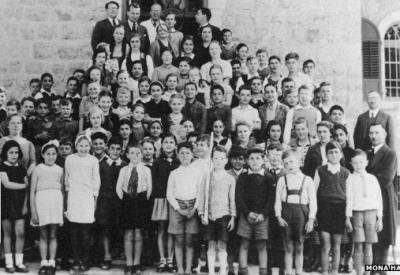Pages in Section 8

Tasks facing the Palestine Police at the Start of WW 2
ii. After Dunkirk
iii. OP Final Fortress
iv. Police Involvement in Syria and Iraq
v. The Lehi and Avraham Stern
vi. Britain's Break with the Palmach
Although Britain did not officially declared War on Germany until September 3rd 1939,during the last week in August preparations for war were in full swing and the public began to panic. There was a run on the banks and people started to hoard non-perishable goods. The government responded on Sunday 27th August, by decreeing a three day Bank holiday. The provisional Executive of the Jewish Agency and the Jewish National Council came to the aid of the authorities and assured Palestine Jewry via the Palestine Post and Jewish language newspapers that essential supplies were adequate, there was NO reason for either hoarding or profiteering and that competent bodies,prepared for war needs, were paying special attention to Air Raid Precautions.
 On the evening of the last Monday in August,Superintendent Raymond Cafferata and other high ranking Haifa police officers took part in a slow moving motor cavalcade with dipped headlights inspecting the efficiency of citizens' blackout from Carmel Avenue in the German Colony to Carmel Point. Traffic Police were posted at various points in Western Haifa, stopping cars carrying headlights, while members of the Volunteer Fire Brigade made the rounds of Kiryat Eliahu and Bat Galim, checking that residents were cooperating.
On the evening of the last Monday in August,Superintendent Raymond Cafferata and other high ranking Haifa police officers took part in a slow moving motor cavalcade with dipped headlights inspecting the efficiency of citizens' blackout from Carmel Avenue in the German Colony to Carmel Point. Traffic Police were posted at various points in Western Haifa, stopping cars carrying headlights, while members of the Volunteer Fire Brigade made the rounds of Kiryat Eliahu and Bat Galim, checking that residents were cooperating.
(Palestine traffic police.)
 Another job for the police, on declaration of war, was rounding up enemy nationals. Although German Templers had been eligible for Palestinian citizenship by right of residence since 1923, the majority had chosen to remain German citizens. Their young men had already left Palestine, having been conscripted into the German army. The rest of the Templers were now declared enemy nationals. The police had to organize transport to take men of military age to a prison camp near Acre and women, children and old men to four rural German Colonies, now transformed into internment camps.
Another job for the police, on declaration of war, was rounding up enemy nationals. Although German Templers had been eligible for Palestinian citizenship by right of residence since 1923, the majority had chosen to remain German citizens. Their young men had already left Palestine, having been conscripted into the German army. The rest of the Templers were now declared enemy nationals. The police had to organize transport to take men of military age to a prison camp near Acre and women, children and old men to four rural German Colonies, now transformed into internment camps.
( a German Templer school in 1936 )
On September 1st in a Palestine Gazette Extraordinary Supplement, Sir Harold MacMichael, High Commissioner for Palestine announced he had appointed Christopher Wilson Brown, the Director of Public Works, to take charge of requisitioning materials needed for Palestine's defence. All stocks of requesitioned materials had to be reported to Wilson Brown. As the sale of more and more items to the general public either became illegal or were rationed, it caused increrdible extra for the police.
However, for the first few months Palestine became more peaceful than it had been for years, despite or perhaps because of Palestine becoming a training ground for allied troops from every part of the British Empire. Military tents sprang up in citrus groves, pine woods, wadis and fallow fields.
The Arab Rebellion was at an end. An Arab delegation headed by Ragheb Bey Nashashibi, leader of the moderate Arab Defense Party, called on High Commissioner Sir Harold A. MacMichael to assure him that the majority of Palestinian Arabs were loyal to Britain and would support the Government in the current international crisis.
Both Haganah and Irgun promised to support the allies against the Germans without, however, giving up their determination to resist the terms of the McDonald White Paper.
While everything appeared so peaceful many British members of the Force felt their talents were wasted on administrative tasks that could be accomplished by civilians. The Palestine Police Force in the days before the war was recruited on a contract of service for so many years. Normally at the end of that contract they would have been free to join the armed services of their choice. The Inspector General of Police, while fully appreciating the feelings of his men, could not afford to denude the Force of large numbers of experienced police officers, so that contract of service was cancelled, and men had to remain in the Palestine Police Force as conscripts. Over 300 men, however, were so determined to return to their former regiments, if they had been in the army, or join the RAF or Royal Navy that they took the only way out available. They committed technical military offences, and, after being tried by Court Martial, sentenced to imprisonment and dismissed the Service, served terms of imprisonment initially for one month but increasing to a year as the short sentences proved no deterrent.